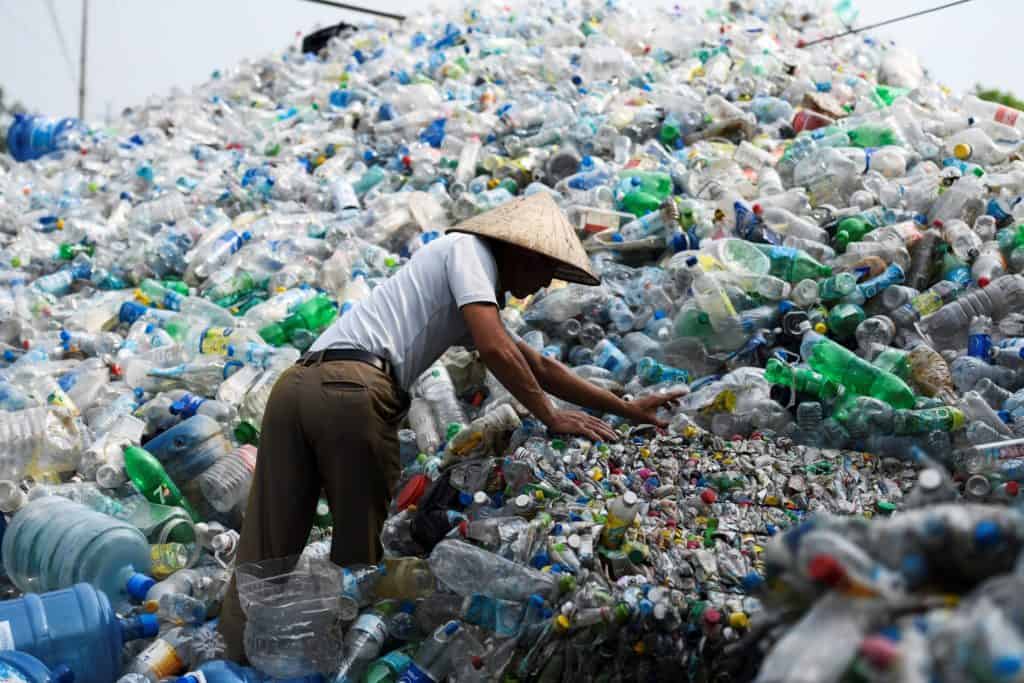
By Dan Murphy
A recent story in The Atlantic warned about a transformation in the business of recycling around the world. “After decades of earnest public-information campaigns, Americans are finally recycling… But now much of that carefully sorted recycling is ending up in the trash, “ writes Alana Semuels.
“For decades, we were sending the bulk of our recycling to China – tons and tons of it, sent over on ships to be made into goods such as shoes and bags and new plastic products. But last year, the country restricted imports of certain recyclables, including mixed paper – magazines, office paper, junk mail – and most plastics. Waste-management companies across the country are telling towns, cities and counties that there is no longer a market for their recycling. These municipalities have two choices: pay much higher rates to get rid of recycling, or throw it all away. Most are choosing the latter.”
China’s departure from the recycling market has resulted in a collapse of the value of most of the materials we all recycle every week. After reading Semuels’ story, I wondered: Are Westchester County’s recyclables being recycled?
Greenburgh Supervisor Paul Feiner asked the same question. After inquiring to the Westchester County Solid Waste Commission, Feiner received the following response from Louis Vetrone, Deputy Commissioner of the Westchester County Department of Environmental Facilities.
Dear Supervisor Feiner:
This correspondence is in response to your letter to Patricia O’Callaghan of the Westchester County Solid Waste Commission, dated March 6, 2019, wherein you requested that the county provide a response to an article about recycling that appeared recently in The Atlantic.
The article, entitled “Is This the End of Recycling?” cites many municipalities throughout the nation that have chosen to end or suspend their recycling programs in response to the recent recession in the recyclables market. Fortunately, Westchester County’s Refuse Disposal District incorporates a dual-stream recycling program and operates a material recovery facility equipped with state-of the-art sorting equipment that combine to produce a product that is very desirable on the recyclables market. As a result, the county continues to market all of its curbside recyclables.
For many years, China was the largest importer of recyclables. In late 2017, China enacted provisions of its National Sword Policy, which banned the import of certain recyclables and set contamination limits on other imported recyclables that are very difficult to meet. China’s goal is to develop a system that takes advantage of recyclables generated from within its own borders. Other importers, such as Vietnam, have attempted to fill the void left by China’s departure from the market. However, these countries have been overwhelmed by the influx of recyclables and have now begun setting their own strict contamination limits. The result has been a significant recession in the recyclables market.
The refuse disposal district is a dual-stream recycling jurisdiction, requiring residents to separate pulp recyclables (paper and cardboard) and commingled recyclables (glass, plastics and metals). Many municipalities outside of Westchester and across the country utilize single-stream recycling, which allows residents to combine all of their curbside recycling (pulp and commingled) in one container. Generally, single-stream recyclables have a higher level of contamination than dual-stream recyclables. Glass containers break and get embedded in the paper and cardboard, while residual liquid in beverage containers also contaminates and lowers the values of pulp recyclables. Since the onset of the recycling recession, many single-stream municipalities have experienced difficulty marketing their recyclables. Some of these jurisdictions located outside of New York State, several of which are cited in The Atlantic article, have ended or suspended their recycling programs altogether.
Westchester County combines dual-stream recycling with a material recovery facility that was recently retrofitted with optical sorters and automated paper screeners. As a result, the county processes clean, high-grade recyclables. Throughout the chaos in the recycling market, Westchester has continued to market and recycle all of the materials left at the curb by our residents. (End of Vetrone response.)
Vetrone’s detailed response shows that Westchester County is at the forefront in its efforts to recycle the waste from its residents. And Paul Feiner’s inquiry shows that our elected officials in Westchester are asking the right questions and making sure our efforts at home to recycle are not going to waste, literally.
In neighboring Putnam County, residents are not required to separate their recyclables, which means it is likely that their waste is no longer being sold. The “recycling recession” that Vetrone points to isn’t going away, and the days of selling our nation’s recyclables with ease have come to an end. Fortunately, Westchester County government is leading the way.





